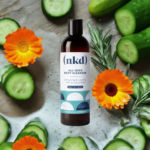When it comes to body care, one of the most fundamental decisions you’ll make is whether to use traditional soap or a soap-free body wash. Both products serve the same basic purpose – to cleanse your skin – but they do so in very different ways. With an increasing focus on skin health and ingredient transparency, many people are questioning which option is better for their skin. In this article, we’ll break down the key differences between soap-free body wash and traditional soap, and help you decide which is the best choice for your skin.
What is Traditional Soap?
Traditional soap, typically made from fats and oils combined with an alkali (like lye), has been used for centuries to clean and disinfect the skin. When mixed with water, soap molecules create a lather that binds to dirt, oils, and impurities on the skin’s surface, allowing them to be washed away. While soap is highly effective at cleansing, its ingredients and pH levels can sometimes be harsh on the skin.
What is Soap-Free Body Wash?
Soap-free body washes, on the other hand, are typically formulated with synthetic or plant-based surfactants (cleansing agents) that do not contain alkali. These products are often designed to be milder and more hydrating than traditional soaps. Soap-free body washes can contain a wide variety of ingredients, from natural oils and moisturisers to soothing botanical extracts, making them suitable for different skin types, including sensitive skin.
Key Differences Between and Traditional Soap
1. pH Balance
One of the biggest differences between soap-free body wash and traditional soap lies in their pH levels. Traditional soaps tend to have a higher, more alkaline pH, usually around 9 to 10, which can disrupt the skin’s natural pH. The skin’s natural pH is slightly acidic, ranging from 4.5 to 5.5, and this acidity helps protect against harmful bacteria and environmental damage.
Soap-free body washes, on the other hand, are usually formulated to be pH-balanced, meaning they match the skin’s natural pH more closely. This helps preserve the skin’s protective barrier, keeping it hydrated and less prone to irritation.
Verdict: For maintaining the skin’s natural pH balance, a soap-free body wash is generally the better option, particularly for those with sensitive skin.
2. Moisture Retention
Traditional soap, due to its higher pH, can strip the skin of its natural oils. This can lead to dryness, tightness, and flakiness, especially for people with already dry or sensitive skin. Many traditional soaps can also irritate the skin by disrupting its natural lipid barrier.
Soap-free body washes tend to be more hydrating and skin-friendly, as they are formulated with moisturising ingredients like glycerin, aloe vera, or essential oils that help to lock in moisture. These body washes cleanse without over-drying, leaving the skin soft and nourished.
Verdict: If you have dry or sensitive skin, a soap-free body wash is more likely to help maintain your skin’s moisture.
3. Suitability for Sensitive Skin
Soap can sometimes cause irritation for people with sensitive skin, as the alkaline nature of traditional soap can disrupt the skin’s protective barrier. This can lead to redness, itching, or even flare-ups of skin conditions like eczema or dermatitis.
Soap-free body washes are generally designed to be much gentler and less irritating, making them a better choice for those with sensitive skin. Many soap-free formulations include soothing ingredients like chamomile, calendula, and chamomile, which can help calm and protect sensitive skin while cleansing.
Verdict: For sensitive skin, a soap-free body wash is typically a better and gentler choice.
4. Cleansing Effectiveness
While soap-free body washes are often milder, they are still highly effective at removing dirt, oils, and impurities from the skin. In fact, many soap-free body washes contain surfactants that can clean just as effectively as traditional soap, without leaving the skin feeling dry or stripped. Soap can be effective at cleaning the skin, but it can also be harsh, leading to potential irritation and dryness if used too frequently or if the skin is particularly sensitive.
Verdict: Both traditional soap and soap-free body wash are effective at cleaning, but soap-free washes offer a gentler option with less risk of skin irritation.
5. Environmental Impact
Traditional bar soaps are often packaged in paper or cardboard, which is more eco-friendly than plastic bottles commonly used for body washes. However, the manufacturing process of soap can still use harsh chemicals and unnecessary by-products.
Soap-free body washes are often packaged in plastic bottles, though many brands are now opting for sustainable, recyclable packaging. Moreover, some soap-free body washes are formulated with plant-based surfactants, which can be more eco-friendly compared to the chemical surfactants in traditional soaps.
Verdict: Traditional soap may have a lower environmental impact due to its simple packaging, but soap-free body washes can still be eco-friendly if they are produced and packaged sustainably.
6. Variety of Ingredients and Added Benefits
Traditional soaps can be limited in terms of the added ingredients that contribute to skin health. While some soaps contain essential oils or moisturisers, many are made with basic ingredients like sodium hydroxide and animal fats, which may not provide added skin benefits.
Soap-free body washes, on the other hand, often contain a wide range of beneficial ingredients like hyaluronic acid, vitamin E, aloe vera, and various natural oils that can nourish, hydrate, and even help protect the skin. Some soap-free body washes are also formulated with exfoliating agents or antibacterial properties, offering extra skin care benefits.
Verdict: Soap-free body washes offer a wider variety of ingredients and benefits, making them a more versatile option for those seeking more than just basic cleansing.
Which One Is Better for You?
Ultimately, the choice between a soap-free body wash and traditional soap depends on your skin type, preferences, and concerns. Here are some general guidelines:
- Choose a Soap-Free Body Wash if you have dry, sensitive, or delicate skin, or if you’re looking for a gentler, more moisturising option. It’s also the best choice if you want to maintain the skin’s natural pH balance.
- Stick with Traditional Soap if you have normal to oily skin and prefer a more basic, eco-friendly option with minimal packaging.
No matter your choice, the key to healthy skin is selecting products that align with your skin’s specific needs, whether that’s a soap-free wash or a classic bar of soap.





